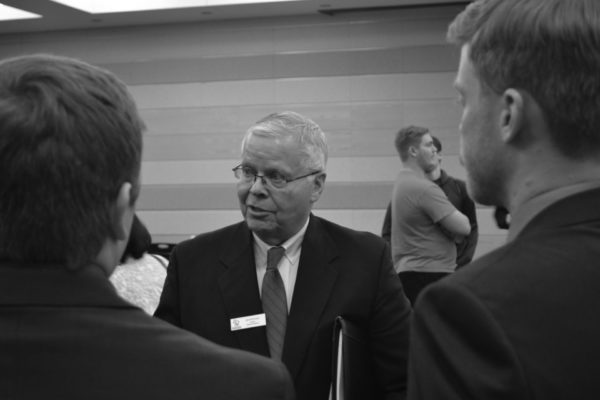UW President speaks at civil discourse event
April 22, 2024

Universities of Wisconsin President Jay Rothman spoke at a civil discourse event hosted by the Student Government Association, or SGA, on Mar. 12 at UW-River Falls’ University Center. Rothman discussed the necessity of First Amendment freedoms and civil discussion on University of Wisconsin campuses and in American society as a whole.
Rothman discussed some of the challenges that students and citizens face in the United States political climate, such as echo chambers caused by algorithms on the internet and especially on social media. According to Oxford Languages, an echo chamber is “an environment in which a person encounters only beliefs or opinions that coincide with their own, so that their existing views are reinforced and alternative ideas are not considered.”
Rothman also highlighted the importance of University of Wisconsin campuses in advocating for First Amendment freedoms. “Our universities need to be models of civil dialogue, where critical ideas are debated passionately [and] vigorously, but civilly.”
“The challenges facing our state, our nation, and our world are complicated and nuanced and they will not be resolved by sound bites and Tweets,” Rothman told those in attendance. “...Within the Universities of Wisconsin, I believe that the right of our students to express themselves freely is not the primary issue. I believe the real challenge is civil dialogue: …the act of respectfully sharing views or opinions and listening to the views of others.”
“We live in challenging times,” he added. “The First Amendment protects a broad range of speech, including speech that we might find disturbing, offensive, or even reprehensible.”
Rothman also spoke on the findings of the UW System’s Student Views on Freedom of Speech survey, which collected data from over 10,000 students from the 13 UW universities to determine students’ “...attitudes about viewpoint diversity and their experiences with free expression and self-censorship at UW universities,” as the results stated. The survey was conducted in the fall of 2022, and results were released on Feb. 1, 2023.
“Our students reported that our faculty instructors are generally doing a good job in facilitating robust discussion in the classroom,” Rothman said. “The not-so-good news is that our students reported an increasing unwillingness to share their viewpoints in the classroom, particularly those who identified as more conservative ideologically.”
Rothman said that this “increasing unwillingness” is the result of a variety of factors, such as students’ concerns about negative reactions from fellow students and professors, and concerns that discussing their ideas would have a negative impact on their grades.
The survey also measured respondents’ likelihood of considering viewpoints that they disagreed with. 57% said that they were unlikely to consider opposing viewpoints related to “abortion, sexual assault, and transgender issues.” The results said, “Only about 1 in 10 students reported that they would be extremely likely to consider viewpoints they disagreed with.”
“We listen to views that make us feel good as opposed to those that don’t make us think,” Rothman said, and referenced psychologist, professor, and author Adam Grant’s Think Again: The Power of Knowing What You Don’t Know. “If we aspire to civil dialogue, we must be willing to discern fact from fiction, and opinion from truth.”
Following his speech, Rothman opened the forum to questions from the audience regarding free speech. Topics included forming friendships with individuals who differ in their ideologies, Wisconsin state legislature bills, and controversial speakers on UW campuses.
Another topic was diversity, equity, and inclusion, or DEI, efforts on UW campuses, which was raised by student Brady Penfield. Penfield asked about the deal established between the UW System’s Board of Regents and the Wisconsin state legislature on Dec. 13, 2023. The deal put a freeze, as well as a cap, on DEI program hiring, in exchange for state funding.
“That deal was imperfect at best,” Rothman responded. “But it was one that I thought was unbalanced in the best interest of the Universities of Wisconsin. It did not take away, from my perspective, of why diversity and inclusion on our campuses is absolutely critical.”
Penfield also asked about Rothman’s beliefs on DEI initiatives. “DEI has to be interwoven throughout the strategic plan,” Rothman said. The strategic plan is the sum total of UW System efforts to address ongoing budget deficits and issues at many of its universities.
“That starts with me,” Rothman added. “It starts with every single employee at the Universities of Wisconsin that has to be committed to recruiting, enrolling, retaining, graduating and getting into the workforce a diverse student body…. We are not going to serve the state of Wisconsin well unless we get diversity and inclusion right.”
“We want to acknowledge there is an issue, but there are ways to address it,” Rothman said, referring to civil dialogue. “...We need to create a culture that more openly values freedom of expression, and make sure that students understand their rights and responsibilities under the First Amendment and recognize that those same rights extend to their classmates.”
Following the civil discourse event, attendees visited various student organization tables, which included displays, political aptitude quizzes, political literature, discussions, and more.
